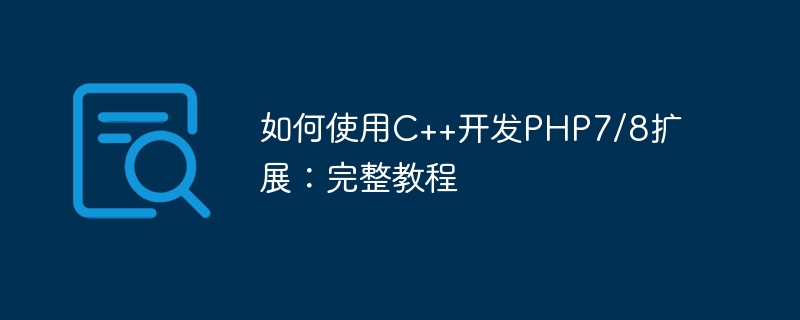

How to use C to develop PHP7/8 extensions: complete tutorial
Introduction:
PHP is a widely used scripting language, and C is a high-level Performance programming language. By using C language, we can create powerful extensions for PHP, increasing its functionality and performance. This article will provide a complete tutorial detailing how to develop PHP7/8 extensions using C and provide code examples.
Step 1: Environment Setup
Before we begin, we need to make sure that the development environment is set up correctly.
1.1 Install PHP
First, we need to install PHP. You can download the latest version of PHP from the PHP official website (www.php.net) and follow the instructions to install it.
1.2 Install the development toolkit
Install the development toolkit to compile and build PHP extensions. You can install the development kit through a package manager (such as apt, yum, etc.) or by compiling from source code.
1.3 Configuring the PHP development environment
In order to use the development functions of PHP, we need to ensure that the development mode is enabled in the configuration file. In the php.ini file, find and make sure that the following lines are not commented out:
; Development environment ; extension=gd2 ; extension=xml ; ...
Remove the semicolon (;) in front of these lines, then save and close the file.
Step 2: Create an extension module
The following are the steps to create a simple PHP extension module:
2.1 Create folders and files
In your project directory, create A folder to save your extension modules. Name it "my_extension". Then create a C source file in this folder and name it "my_extension.cpp".
2.2 Write extension module code
Open the "my_extension.cpp" file and use the following code to write the code for the extension module:
#include <phpcpp.h>
void hello_world()
{
Php::out << "Hello World!" << std::endl;
}
/**
* Extension initialization function
*/
extern "C" void __declspec(dllexport) *get_module()
{
static Php::Extension extension("my_extension", "1.0");
extension.add<hello_world>("hello_world");
return extension;
}
The above code uses the Php::Extension class, It provides a convenient interface to define extension modules and their functionality.
2.3 Write the configuration file of the extension module
Create a text file named "config.m4" and add the following content in it:
PHP_ARG_ENABLE(my_extension, whether to enable my_extension support, [ --enable-my_extension Enable my_extension support])
This configuration file tells the PHP compiler whether The extension should be compiled and enabled.
Step 3: Compile and install the extension
Next, we need to compile and install the extension.
3.1 Build the extension
In the project directory, open a terminal and execute the following commands:
phpize ./configure --enable-my_extension make
These commands will build the extension.
3.2 Install the extension
Execute the following command to install the built extension into your PHP extension directory:
make install
Step 4: Test the extension
Now we have successfully installed it extension, we can write a simple PHP script to test the functionality of the extension.
4.1 Create a test script
In your project directory, create a PHP script file named "test.php" and use the following code:
<?php
hello_world();
?>4.2 Run the test script
In a terminal, run the following command to execute the test script:
php test.php
If you see the output "Hello World!", then your extension has successfully worked.
Conclusion:
Through the complete tutorial of this article, we learned how to use C to develop PHP7/8 extensions. We learned the steps for setting up an environment and created a simple extension module. We also learned how to compile, install, and test extensions. I hope this tutorial can help you get started developing PHP extensions in C and provide you with a good starting point for further understanding. I wish you success in developing PHP extensions!
The above is the detailed content of How to develop PHP7/8 extensions using C++: a complete tutorial. For more information, please follow other related articles on the PHP Chinese website!